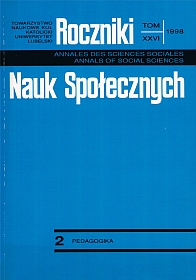Postawy młodzieży wobec katechizacji
Abstrakt
Religious instruction at school still arouses emotions. There are advocates and firm opponents. Some milieus seek to undermine the reasonableness of catechization at school, search out various arguments to remove this subject from school or lessen its influence. The parties involved in the discussion often use stereotypes and simplifications, therefore there is a need for a reliable knowledge about the attitudes of adolescents towards catechization.
The introductory part of the paper shows a historical outline of catechesis, highlighting its Polish context. Teaching religious instruction, as a form of preaching the Good News about salvation, is the basic function of the Church and has always been conducted since the time of Christ. Obviously it took on various forms and embraced various groups, with regard to the times and place. In principle, until Tridentine Council (1545 - 1563) there was mainly religious instruction for adults. The Council issued a recommendation to catechize also adolescents and children. Religious education of the young generation ceased to be the private matter of family, and became an official form of the Church’s activity.
Before the war religion was an obligatory subject in Poland, and this matter aroused no greater controversies. After the communists had taken over the power, they started ideologically-motivated secularization of education, and religious was consistently removed from schools until its total removal after 1961. It was as late as 1990, after the breakthrough, that religion returned to school.
The main purpose of the studies was to answer the following question: what views adolescents hold on the introduction of religion into school? How do the young people evaluate the current religious classes? How is an ideal religious instruction supposed to look like? What is an ideal catechist to be like? The research embraced 851 secondary school pupils from various milieus (rural, provincial, and urban), representing various profiles of education (c. 20 people). The analysis of the collected empirical material proves that about 95 per cent of adolescents attend religious classes and are satisfied that they are conducted at school. The decisive majority (64 per cent) of pupils are satisfied with the level of classes, and only about 10 per cent expressly disapprove of their catechist.
An ideal catechist is he who seriously treated his mission as a preacher of the Good News, who not only teaches the truths of God but is a young man’s friend, who leads him into the sphere of the sacral life. The youth expect an attitude of dialogue marked with an understanding for others, friendship and respect for the pupil. The catechist should enjoy personal authority, be competent, well educated and wise. With such a religious leader, the young people wish to initiate conversations, not only about faith, but also on personal and family matters; such a catechist they hold in high esteem and present as an ideal model for other teachers of religion.
Copyright (c) 1998 Roczniki Nauk Społecznych

Utwór dostępny jest na licencji Creative Commons Uznanie autorstwa – Użycie niekomercyjne – Bez utworów zależnych 4.0 Międzynarodowe.


